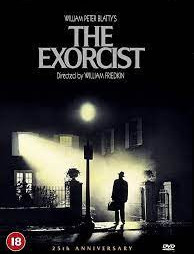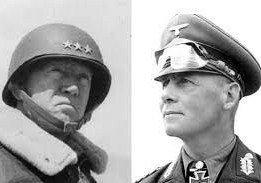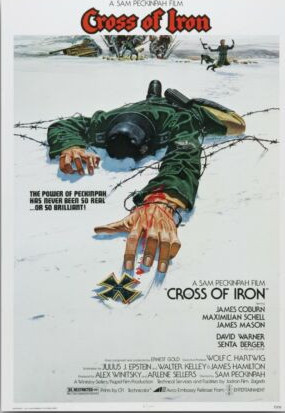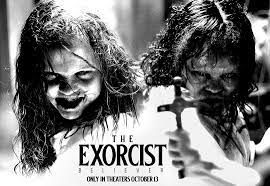Of all the William Friedkin films I could have picked, I doubt that anyone would think that The Exorcist would be the one to be included when writing about Second World War films. The quotation is taken from an interview with the director for the 25th Anniversary VHS Edition. If this piece of work was rewritten today, it would probably include an addition to Friedkin’s quotation with one by Robert Downey Jr when discussing Oppenheimer and Christopher Nolan’s approach to making films.  He says: [Nolan’s filmmaking] “is always inviting conversation, he’s always presuming the audience wants to be elevated to a place where there is a dialogue that continues on.” This is the first part of two of this section of the thesis.
He says: [Nolan’s filmmaking] “is always inviting conversation, he’s always presuming the audience wants to be elevated to a place where there is a dialogue that continues on.” This is the first part of two of this section of the thesis.
Factors for consideration in the study of war film.
William Friedkin, the director of The Exorcist has:
“Always believed that film should be an emotional experience, it should make you laugh or cry or be scared, but it should also inspire and provoke you and make you reflect.” 
The filmmaker must work hard to stimulate the viewers’ emotions to make them forget their comfortable surroundings. The film has, therefore, to appeal to the sensibilities of as many of the cinema audience as possible. Therefore, as the population has changed since the late 1930s, so have the methods that filmmakers have adopted to appeal to the masses.
Keegan’s ‘passions’ and ‘unresolved problems’ that have led to so many Second World War films immediately provide many of Friedkin’s ingredients, so the filmmaker has a head start. In relation to the theme of war represented in such films, the situation is more complicated with a multitude of factors affecting the representation of the theme.
Realism?
Realism is the most complicated factor. In the fantasy world of feature films, it is an abstract concept. The relative comfort of the viewer creates an atmosphere whereby attaining total empathy is impossible. Surrounded either by the comfort of home with an arbitrary ability to start and stop the film as they desire or in a warm, dark auditorium surrounded by hundreds of people eating popcorn inhibits the levels of reality achieved in the film viewing situation. However, this has not stopped filmmakers from utilizing every possible technological and dramatic process to produce as much realism as possible.
The subject of realism itself can be broken down into various linked categories. The most important factor, from a historical perspective, is the realistic portrayal of actual events. Another would be the realistic representation of the motivations and emotions of the characters but most importantly for the purposes of this study, the realistic portrayal of the theme of decency.
It is the representation of this theme that has appeared to change and develop most in the sixty-year period considered in this study. In this way, the question considered is whether the stereotypical character representations of earlier films are more realistic than those of later films and if this is or is not the case, what factors have led to this change.
Heroism
A key factor in relation to character representations that is important is the portrayal of heroes and what is deemed heroic. There are films within this study that undoubtedly glorify the pursuit of war and those that pursue it portraying great commanders such as Rommel and Patton as heroes and portraying great battles such as D-Day and The Battle of Britain as heroic. These representations tend to appear only in the pre-1970 era. Since then, the onus has shifted to less significant characters, such as previously unnamed lower ranks. This focus on the lower echelons of the military establishment and not the large-scale battles highlights more personable stories and that military action was often a battle for survival, not success against the enemy. This is clearly a progression from larger-than-life stories to everyday characters in the essentially civilian armies that find themselves reacting to the demands and stresses of war.
These representations tend to appear only in the pre-1970 era. Since then, the onus has shifted to less significant characters, such as previously unnamed lower ranks. This focus on the lower echelons of the military establishment and not the large-scale battles highlights more personable stories and that military action was often a battle for survival, not success against the enemy. This is clearly a progression from larger-than-life stories to everyday characters in the essentially civilian armies that find themselves reacting to the demands and stresses of war.
Changing Attitudes
Changes in attitudes in the Western World since the 1930s have affected the portrayal of certain themes in relation to war films. The xenophobic anti-German rhetoric of earlier films does not inspire modern filmgoers in the way it influenced their parents or grandparents. This younger generation has grown up with few anti-German animosities most especially in the United States, which dominates the war film genre post-1970. This study will highlight the changing portrayal of German and Allied characters. The move from the stereotypical comic book, goose-stepping, rhetoric-fuelled character towards a more balanced interpretation can be seen in films such as Cross of Iron, highlighting an army disillusioned with their leaders and war-mongering policies.  None of the films selected defend atrocities perpetrated by the Nazi regime but instead show that most of both Allied and Axis soldiers were young men confronting the same horrors of war and desire to survive. In conjunction with increasingly sophisticated German characters in war films, a fuller treatment of certain ethical, moral, or political taboos that arise from dealing with such a diverse and emotional subject as war is considered.
None of the films selected defend atrocities perpetrated by the Nazi regime but instead show that most of both Allied and Axis soldiers were young men confronting the same horrors of war and desire to survive. In conjunction with increasingly sophisticated German characters in war films, a fuller treatment of certain ethical, moral, or political taboos that arise from dealing with such a diverse and emotional subject as war is considered.
The first film considered in the thesis is (As an Amazon Associate I earn from qualifying purchases) Foreign Correspondent
However, there is a section on other considerations made during the writing of the thesis.
What’s next?
I have been to see Oppenheimer and a review of the film will be winging its way onto the site as soon as it’s finished. Considering the main thrust of Nolan’s film, it is interesting that this section of the thesis says that the theme of decency will be considered. The review will also link to a visit I made to a local Second World War site near my home, that I was reminded of in the cinema. The added benefit of this visit is that it will keep spellcheck and Grammarly on their toes as its location in Rhydymwyn in North Wales and the factory there that was instrumental in Britain’s first forays into creating a nuclear weapon. The main purpose of the factory was to produce mustard gas to retaliate against Germany if they decided to use it against Britain.
The review will also link to a visit I made to a local Second World War site near my home, that I was reminded of in the cinema. The added benefit of this visit is that it will keep spellcheck and Grammarly on their toes as its location in Rhydymwyn in North Wales and the factory there that was instrumental in Britain’s first forays into creating a nuclear weapon. The main purpose of the factory was to produce mustard gas to retaliate against Germany if they decided to use it against Britain.
A future plan will also be to make more visits to other local[ish] Second World War sites and report on them.
Take care
BigT
